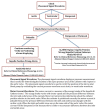Checklist design and implementation: critical considerations to improve patient safety for low-frequency, high-risk patient events
- PMID: 35518377
- PMCID: PMC8936617
- DOI: 10.1136/bmjstel-2018-000353
Checklist design and implementation: critical considerations to improve patient safety for low-frequency, high-risk patient events
Abstract
Purpose: This pilot project describes the development and implementation of two specialised aviation-style checklist designs for a low-frequency high-risk patient population in a cardiac intensive care unit. The effect of the checklist design as well as the implementation strategies on patient outcomes and adherence to best practice guidelines were also explored. The long-term objective was to improve adherence to accepted processes of care by establishing the checklists as standard practice thereby improving patient safety and outcomes.
Methods: During this project, 10specialised crisis checklists using two specific aviation-style designs were developed. A quasiexperimental prospective pre-post repeated measure design including surveys along with repetitive simulations were used to evaluate self-confidence and self-efficacy over time as well as the perceived utility, ease of use, fit into workflow and benefits of the checklists use to patients. Performance, patient outcomes and manikin outcomes were also used to evaluate the effectiveness of the crisis checklists on provider behaviours and patient outcomes.
Results: Overall self-confidence and self-confidence related to skills and knowledge while not significant demonstrated clinically relevant improvements that were sustained over time. Perceptions of the checklists were positive with consistent utilisation sustained over time. More importantly, use of the checklists demonstrated a reduction in errors both in the simulated and clinical setting.
Conclusion: Recommendations from this study consist of key considerations for development and implementation of checklists including: utilisation of stakeholders in the development phase; implementation in real and simulated environments; and ongoing reinforcement and training to sustain use.
Keywords: crisis checklists; intensive care unit; low frequency high risk patient events; patient safety; repetitive simulation.
© Author(s) (or their employer(s)) 2020. No commercial re-use. See rights and permissions. Published by BMJ.
Conflict of interest statement
Competing interests: None declared.
Figures


Similar articles
-
Institution-Specific Perinatal Emergency Checklists: Multicenter Report on Development, Implementation, and Sustainability.Am J Perinatol. 2024 May;41(S 01):e1099-e1106. doi: 10.1055/a-1990-2499. Epub 2022 Nov 30. Am J Perinatol. 2024. PMID: 36452973
-
Perceptions of rounding checklists in the intensive care unit: a qualitative study.BMJ Qual Saf. 2018 Oct;27(10):836-843. doi: 10.1136/bmjqs-2017-007218. Epub 2018 Mar 23. BMJ Qual Saf. 2018. PMID: 29572299 Free PMC article.
-
Testing the effects of checklists on team behaviour during emergencies on general wards: An observational study using high-fidelity simulation.Resuscitation. 2020 Dec;157:3-12. doi: 10.1016/j.resuscitation.2020.09.031. Epub 2020 Oct 4. Resuscitation. 2020. PMID: 33027620
-
Implementation of safety checklists in surgery: a realist synthesis of evidence.Implement Sci. 2015 Sep 28;10:137. doi: 10.1186/s13012-015-0319-9. Implement Sci. 2015. PMID: 26415946 Free PMC article. Review.
-
More Than a Tick Box: Medical Checklist Development, Design, and Use.Anesth Analg. 2018 Jan;126(1):223-232. doi: 10.1213/ANE.0000000000002286. Anesth Analg. 2018. PMID: 28763359 Review.
Cited by
-
Verifiable Summarization of Electronic Health Records Using Large Language Models to Support Chart Review.medRxiv [Preprint]. 2025 Jun 3:2025.06.02.25328807. doi: 10.1101/2025.06.02.25328807. medRxiv. 2025. PMID: 40502573 Free PMC article. Preprint.
-
Transforming the delivery of care from "I" to "We" by developing the crisis resource management skills in pediatric interprofessional teams to handle common emergencies through simulation.BMC Med Educ. 2024 Jun 11;24(1):649. doi: 10.1186/s12909-024-05459-2. BMC Med Educ. 2024. PMID: 38862911 Free PMC article.
-
Assessment of the occurrence of adverse events through the global trigger tool in a university hospital in Italy.Sci Rep. 2025 Jul 4;15(1):23973. doi: 10.1038/s41598-025-08617-8. Sci Rep. 2025. PMID: 40615481 Free PMC article.
-
A Complex Intervention to Minimize Medication Error by Nurses in Intensive Care: A Case Study.Healthcare (Basel). 2025 Jan 2;13(1):66. doi: 10.3390/healthcare13010066. Healthcare (Basel). 2025. PMID: 39791673 Free PMC article.
-
Enhancing patient safety in radiotherapy: Implementation of a customized electronic checklist for radiation therapists.Tech Innov Patient Support Radiat Oncol. 2024 May 28;31:100255. doi: 10.1016/j.tipsro.2024.100255. eCollection 2024 Sep. Tech Innov Patient Support Radiat Oncol. 2024. PMID: 38882236 Free PMC article.
References
-
- Flin RH, O’Connor P, Crichton M. Safety at the sharp end: a guide to non-technical skills: Ashgate Publishing, Ltd, 2008.
-
- Reason J Human error, Cambridge University Press. 1990.
LinkOut - more resources
Full Text Sources
